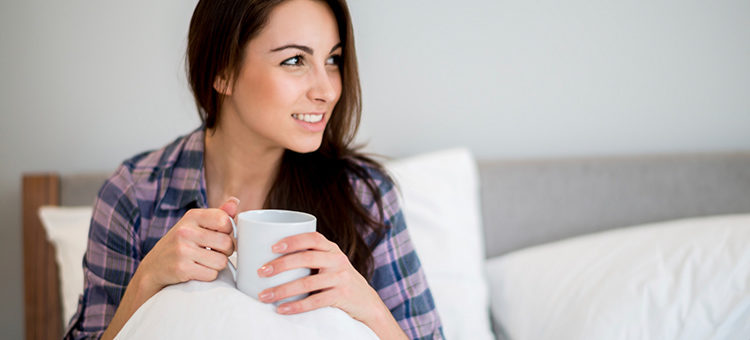
Advice on Falling Asleep (2024)
We are owned and operated by GoodMorning.com. We hire 3rd-party engineers and use public data to rate mattresses on over 30 criteria that we believe are important. Brands we own—Douglas, Juno, Octave, Logan & Cove, and Novosbed—are reviewed and advertised where indicated. Views expressed here are our opinions only. Full details.
A sleepless night is hard on the body, mind, and spirit. When these nights add up, the toll can be exhausting. A visit to the doctor may be best if the issue is chronic. But for occasional insomnia, some time-proven advice can help guide you towards restful slumber. If you’re struggling with falling asleep at night, we’ve got 10 useful strategies to help you overcome your insomnia.
Cut out the caffeine
Talk to any sleep expert, read any blog or book on healthy sleep patterns, or chat with your friends about their own experiences, and the advice will be the same: If you want to improve sleep quality and fall asleep at night with ease, cut down on or cut out the caffeine. Caffeine, as a stimulant, not only prevents people from falling asleep, it has the potential to wake folks up once they’ve dropped off. Switching from coffee to tea in the afternoon, or to decaf, can both help. But in truth, abstinence from caffeine after early afternoon is the best aid to insomnia there is.
Electronics in bed
In the last decade, researchers have spent a lot of energy explaining how society’s increased use of electronic devices has affected our brain chemistry. It’s now widely accepted among sleep experts that the blue light emitted by electronic devices is bad for sleep. Likewise, increased time in front of laptops, smartphones, and other screens prevents the brain from winding down at night. If you go to bed at what you consider a sensible bedtime and can’t switch your brain off, consider turning the electronics off earlier.
Essential oils
The sense of smell is more important to your brain than you may realize. You olfactory nerve is highly influential when it comes to brain chemistry. That’s why essential oils can be useful to an insomniac. Lavender scent has been shown to calm the brain and relax muscles. Making the most of the essential oils is easy. You can rub them on your body (usually on the neck, wrists, or feet), giving your brain a chance to enjoy the scents. Additionally, lavender, chamomile, bergamot, and cedarwood oil have all been shown to affect the brain positively when it comes to sleep hygiene.
Don’t drink before bed
Alcohol consumption makes us feel drowsy, so it’s tempting to believe that drinking before bed can encourage a good night’s sleep – but it’s not true! The ‘metabolic rebound effect’ of alcohol means that if you fall asleep due to the consequences of alcohol, it’s unlikely that sleep will last all night. Instead, once your body has processed the alcohol – after two hours or so – your metabolism increases and REM sleep is interrupted. And with a bladder dealing with diuretics, it’s increasingly likely you’ll wake up.
A consistent sleep routine
Insomniacs often grab sleep wherever and whenever they can get it. If the mood for some shuteye arises in the afternoon after a restless night, why not take a power nap? The short-term benefits are tempting. But this is not a long-term solution to insomnia. Having an established sleep pattern that the brain is used to will help you fall asleep at night. Going to bed at a regular time, sleeping for the same length of time each night, and skipping daytime naps can help cure insomnia. Sure, people have different circadian rhythms, and some folks are natural nappers. But the point stands – if you are trying to break a cycle of insomnia, having a back-to-basics sleep schedule is a good idea.
Enjoy a nightly foot bath
It sounds odd, but studies have shown that a hot foot bath before bed may be useful practice for falling asleep. If foot baths truly aren’t your thing, consider showering or bathing at night instead of in the morning. The same study showed that nighttime bathers might fall asleep more quickly than those who like to shower in the morning. To regulate its temperature, the body responds to a warm bath or shower by overcooling, replicating the same drop in internal temperature that signals it’s time to doze off for the night.
Try a new mattress
If your insomnia is related to back pain or an uncomfortable mattress, your sleepless nights may be easily cured. Getting the right kind of mattress for your sleep position, body type, or spinal-support needs can make a significant difference to your sleep health. Check out our guide on mattress selection to see which mattress type is right for you. Investing in a new mattress may be invaluable to your peace of mind in the long run.
Exercise regularly
It’s no longer considered bad for sleep to exercise at night time. There is no substantial evidence to show that those who exercise early in the day sleep better than those who exercise at night. However, there is evidence that suggests people who exercise at any time of the day fall asleep better than those who don’t exercise at all. It’s not rocket science – if you have insomnia, exercise your body until it’s tired. Sleep will come soon after.
Try a new pillow
Neck pain can keep a person awake at night. And a poorly supported neck and head can block a sleeper’s airways and encourage snoring. Falling asleep again after waking up because of snoring is a nightmare. So why not check out the latest developments in pillow technology and invest in one that’s perfect for your body type and comfort preferences?
Melatonin
Melatonin is a hormone that is made by the pineal gland in the brain. It works by getting your body ready for sleep and is triggered by your body clock. Humans can interrupt their circadian rhythms with irregular sleep patterns and other behaviours. Melatonin is available over the counter in pill form and can be helpful in reestablishing a healthy sleep pattern. Don’t overdo it though! The idea is to allow the body’s melatonin to do its job, so taking too much of the pill form can be a cause of insomnia.
Insomnia is curable with healthy behaviours
If insomnia is a problem for you, these tips are a good start towards establishing a healthy sleep routine. If the problem persists, consult your doctor; there have been some incredible advances in sleep science in recent years.
Shopping for a new mattress? Check out our list of the year’s Best Mattresses.


